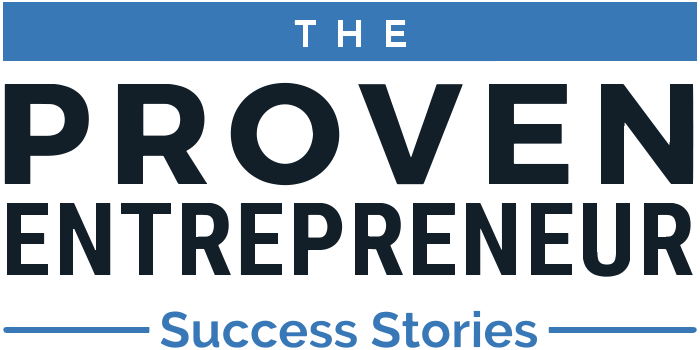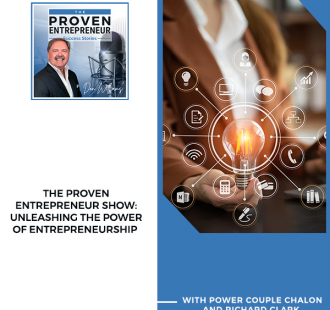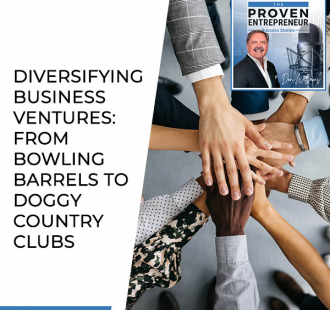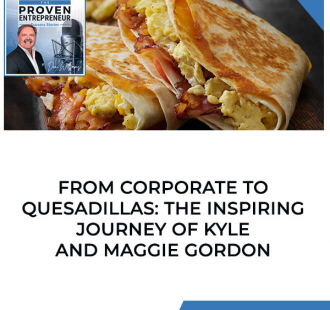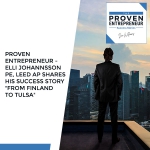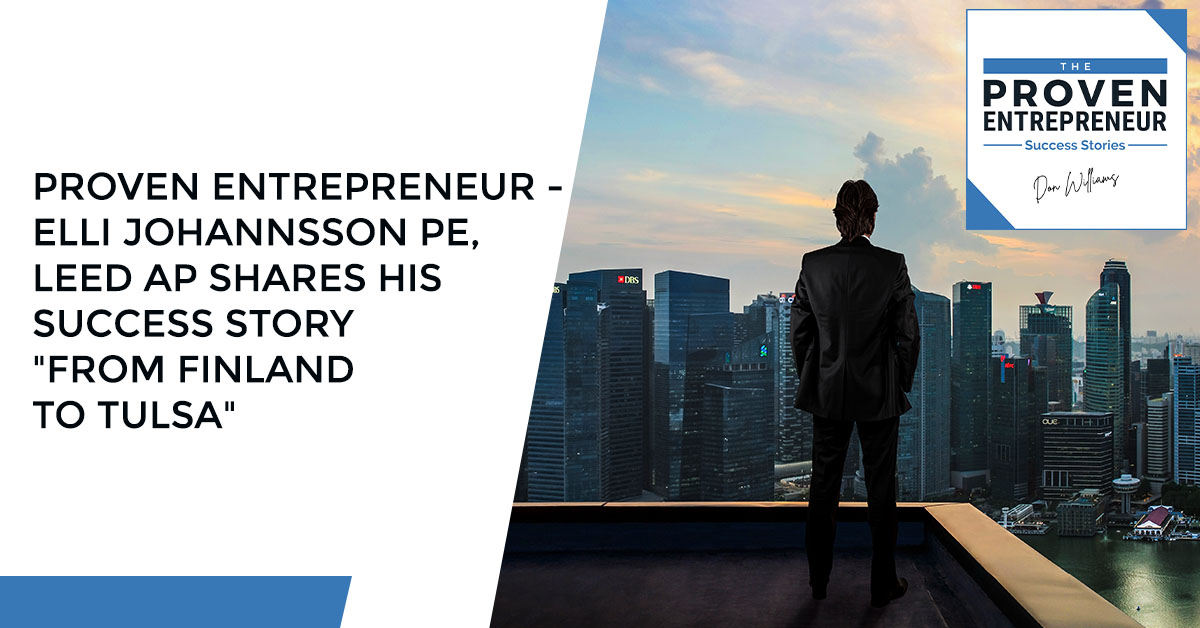
Is it ever too early to learn work ethics? In this episode of Don Williams’ Proven Entrepreneur, Elli Johannsson PE, LEED AP, one of Tulsa Community College’s 50 Notable Alumni, Owner and Principal of 360 Engineering, shares his journey as a young entrepreneur.
From selling extra paper to coffee shops, running a stucco division to putting up historical buildings, and providing services to retail giants. Tune in and learn how he overcame the pressures of adapting to a new environment, worked around challenges and converted them into opportunities.
For information on how to work with Don visit Work With Don Williams
You can also reach out to Don Williams at https://donwilliamsglobal.com
Please join Don and his businesses in support of St. Jude’s Children Research Hospital in its Mission to cure Childhood Cancers. You can donate to St. Jude at stjude.org/donate
—
Listen to the podcast here
Proven Entrepreneur – Elli Johannsson PE, LEED AP Shares His Success Story “From Finland To Tulsa”
I have my good friend from way up North all the way to Tulsa, Oklahoma, Elli Johannsson. Elli owns a company by the name of 360 Engineering. Elli, how are you?
I’m doing excellent, Don. Thank you.
Elli and I have known each other for years. We met in EO or Entrepreneurs’ Organization and attended the Regional Leadership Academy together and our LA forum though our tenants are not great. There you go. Tell me a little bit about your company and what you do there. Let’s start with this. Where are you?
I’m in Tulsa, Oklahoma in our home office here. We have three offices in Tulsa, Oklahoma City and Manhattan, Kansas. We started here in Tulsa. As both clients’ needs and projects grew and then people who were moving for personal reasons to be closer to families, we decided to move to those locations. It tended to be a great opportunity for us to open offices. It has been a great experience. Oklahoma City is doing gangbusters. There are lots of activities right there. We were fortunate to be able to provide our customers with what they needed. They keep sending us more.
I’ll come back to the type of engineering. I love the fact that you had some team members who moved. It sounds to me like rather than looking at that as a negative experience, you looked for the positive, “Could we expand and have a bigger footprint?” Is that how that went?
Yes. Oklahoma City was a natural progression. There are a lot of companies that are either in Oklahoma City or Tulsa. That tends to be the next logical step there. It’s turning those when those things came along. We have had 4 or 5 people move from the Tulsa office to the Oklahoma City office. It provides that flexibility. Most of it is to be with families or a spouse has gotten the job in that area.
As we recruit people out of school, it’s being able to say, “Which one do you prefer?” There is that natural gravitation. Some want to go from the city they aren’t familiar with but have. The bulk of individuals that started either had young kids or young kids coming on the way. It’s being closer to family. It’s making them part of the tribe and then turning the positive into negative. I read Matthew McConaughey’s book, Greenlights.
Tell me about 360 Engineering. What kind of engineering? Are you mechanical, civil or petrochemical?
We’re structural engineers. Sometimes it’s referred to under the civil category but in our world, civil is roads, bridges, land and water types stuff. We do the buildings. The architect comes up with the drawing, what it looks like and how it functions and we make it stand up with steel, concrete, rebar and all that stuff.
Let’s go back to young Elli in childhood before you went off to college. Were your parents entrepreneurial?
My dad is. My mom is not. She is in Iceland still. My father has his company. Even as he was going through school, he was working a side gig as a mason. As that grew, he gained a good reputation for doing quality work. The reputation allowed him to step out on his own. He’s got two businesses. It’s having that, seeing that and working in that business. During college, I would run a stucco division of that group. I was seeing it up front, having to get the money to come in and pay the money out, not just doing the work.
It comes with working in the business or working on the business. That was a valuable experience to go through and see that. As far as the younger side, I always had that restlessness. Going with the flow and through the day was usually not quite enough. I had to have something else go. I remember the grocery store across the street where I used to live. I applied there. I was about 12 or 13 or so. They were like, “I love the enthusiasm but you’re a little young. Wait a few years.”
I had to pipe around small routes. For the extra papers that I would have, I would find a coffee shop that wasn’t too far and was in an industrial area. I would go sell the extra copies that I would get if they got damaged. I sold those over there and used that money for going skiing or anything like that. There has been a thread throughout the time like, “I got to push it a little farther and see how I can gain a little bit more out of than the average day.”
You were a hustler early. Often, we see that entrepreneurs, whether their parents were entrepreneurial or not, their parents instilled this deep work ethic. They were doing a paper out, selling extra papers and trying to get a job where you had to be 16 when you were 12. There are big goals and a great work ethic. You don’t have an Oklahoma accent and I have a little Texas accent. Where are you from originally?
I’m originally from Iceland. I was born and grew up there. I’ve been here for many years. I lost the accent along the way. When I first came, I had a pretty thick accent. I’ve heard when you moved to the United States at 16, then your final language skills form at 17, 18 or 19. I got here under the wire and was able to lose some of that or adapt it. I wish I still had a little bit. People will think I’m from Oklahoma but they think I’m from somewhere up North or some other parts of the United States.
Do you get back every once in a while?
I try to go back once a year although I have two canceled trips in 2021 due to the circumstances. It’s great to come back the next time I go. I even did a chapter trip with EO to Iceland. It’s fantastic to do that and be a tourist. I got to go see and do some stuff that you probably never would have done because you go home, visit your family and do the normal stuff. You don’t go do the touristy thing. It was excellent. I got to sit back and take it all in as a tourist.
After your childhood and young Elli, where did you go to college?
I went to Oklahoma State. I moved here at sixteen. The school system is a little different. At sixteen, I ended up going to the Tulsa Community College, which was a fantastic experience. I don’t think I was quite ready to go to a full-sized university and live away at 16 or 17. It got me a chance to adapt a little bit and get language skills. It turned out to be good because I was able to focus so much more on those individual classes instead of the whole experience.
The social, the living on your own and all that happened. That community college turned 50 years old in 2021. They recognized their 50 distinguished alumni. I was one of those. I was proud to do that. They’re successful, unique and remarkable people. I’m part of that group and felt honored to be. That was my first experience in the American school system. I go through that and get recognized for it years later.
Is 360 Engineering your first company?
Yes. It’s a full-on company. I had some rental properties, odds and end types of things like that. It’s the first one with employees and what I call a real business, not just a side hustle.
Am I here to stay or do something else? Click To TweetTell us a little bit about how you started 360 Engineering. You graduated from school. Did you go work for another engineering company for a while? Did you start your company right out of school? How did that go about?
I started at one engineering firm. I worked there for about ten years. I got a great experience. I was exposed to some great and talented people. I got the opportunity to work on a variety of stuff. It’s anything from big things to small things and being out in the field a lot. I remember getting a tenth-anniversary gift card or a thank-you card. It hit me, “It has been ten years.” It snuck up on me. I even remember being part of that company discussion, “What do we do to retain people and recognize them for their longevity and being here?”
I was part of the discussion and the suggestion, “We should do something nice and get the card,” but I did not think of me being on the receiving end of the card and going, “It has been a while.” I reframed and focused, “Am I here to stay or do something else?” The opportunity came along to be more in a leadership position at a different company that was a lot more multifaceted. It’s a full-service firm with architecture, structural and civil. I got a lot more management experience and hands-on with leading a group and interacting with others. That was a good springboard.
I met my business partner there. It was a good springboard for training and diversity and seeing how others did it to start 360. We had started doing some work here and there and some smaller projects people asked us to take a look at. I know some contractors and architects. I was like, “I’ve got this little thing. Can you provide me a little sketch?” That started snowballing a little bit. I was like, “It’s time to give this a shot as a real deal.” We’re fortunate to get started and get great support from our clients. We’re able to grow the business pretty rapidly.
How old is the company?
I started here in 2013.
Many entrepreneurs even when business is going well and things are growing, sometimes hit a warp speed moment. They’re going along pretty well and then all of a sudden, things are clicking. It might be a major contract or an A-player they recruit to the team. Do you have a warp speed moment that you can share with us?
I can’t think of one specific project or instance. When we started, the goal was 5 people, $1 million in revenue and to get into a building. We started in the back of an insurance office. A friend had a couple of empty desks. We showed up with laptops and did that for a few months. We’re in the back of a garage that was under renovation. There were 3 or 4 of us. That was not very conducive to growth or adding more people. Once we bought a building here in the downtown Tulsa area, we moved into that. The goal was five people. We got to that.
As that had enough legs and capacity to do more work, there was a 6 to 8-month period there where we got more projects, finished those and got another one. It was larger and larger. There was a 6 to 8-month period there where they were coming in way faster than we were anticipating. Luckily, we were able to hire some more people. It went from that. You think you hit your goal and you’re going to plateau from there but it hit that, took off and quickly grew. Maybe I’m off on the numbers a little bit here but it doubled in size. It was about 10 to 11 people.
We added some more capability and brought in some contract labor and assistance there. It was that startup excitement phase. I remember hearing people close by. It’s an entertainment district on the downtown edge. A friend said, “It doesn’t matter what time of day or night I drive by that building. There are always cars there and the lights are always on,” which wasn’t necessary. In retrospect, it’s like, “We could have managed that a little bit better so people aren’t here all hours of the day.” It’s exciting being able to grow and have the capital and finances to support that.
Is there a hard lesson or something that you’ve gone through in your entrepreneurial journey that caused a little pain and anguish? In retrospect, you look back and you’re like, “It all worked out for the best but it wasn’t fun at the time.”
The main thing would be the realization that it’s the people. We don’t manufacture anything and sell a product or software. It’s just our ideas, interacting with customers, solving their problems and providing them the documents that convey that idea. It was in the Clinton campaign in ’92. The economy was stupid. I had a moment. I was like, “The people are stupid.” I was not doing a good job of connecting with employees and recognizing what they were going through.
It was more of the construction or manufacturing mentality, “We got to get it done.” That’s the type of stuff. It’s not quite that bad but the mentality was more of, “All that matters is getting it done.” We went through a period where we lost lots of great people. There was never one specific thing but the focus wasn’t on the employees. That was a difficult time. As an entrepreneur starting a company, work is work and people are going to do what they’ve got to do but you take that.
Certainly, I took it that I didn’t do everything I needed to do to keep them overall balanced. I got the engineering part of it or the work part but not the relationships. That has changed how I look at it. Our lay was a huge game-changer for me in seeing the big picture. I don’t do a perfect job of it but I’m doing a lot better at checking in with people and training the vision, how you view the day-to-day operations and my responsibilities instead of just getting the numbers done.
That leadership role is so important. One of my favorite quotes was from Herb Kelleher, the Founder and original CEO of Southwest Airlines. The first part of the quote is not very popular but I like it too. He said, “The customer is not always right.” That goes contrary to what everybody said. He goes on to say, “The customer is not always right but they are always the customer.” They’re still paying the bill. It’s good manners to let them think that they’re always right.
Herb said, “I’m not going to take care of my customers. I’m going to take care of my people and because I take care of my people, my people will take care of my customers.” It worked pretty well for Southwest. They’re the only airline in history that has shown a profit every quarter for 45 years. Some of the others can’t seem to figure out how to make money in their life. It can’t be that hard. All you have to do is copy what Southwest Airlines is doing. We have seen some that came in and attempted to do that.
Think back to twenty-year-old Elli. If we could put you in a time machine, you could go back and have a conversation with your twenty-year-old self but you could only share one piece of advice and as soon as you give that advice, the time machine would bring you back to the current time but you get 10 or 15 seconds to go back, see your 20-year-old self and give 1 piece of advice regarding your entrepreneurial journey, what would that be?
One piece of advice would be to enjoy the journey. It’s not about getting from point A to point B. I used to almost engineer my way to efficiency. I’ll show up to every meeting. There were five minutes of chitchat in the beginning, “How are you doing? How are the kids?” I was like, “I’m going to show up at the meeting five minutes late. We would get that out of the way and get right to business.” It’s that journey. It would be to enjoy the journey and listen along the way.
You’re a typical entrepreneur. There’s one piece of advice you stuck into. Enjoy the journey and listen to other people. When I have to answer that question, my answer has always been this, “Please, get input from diverse people and people who don’t have my personality and don’t see things the way I see them because I’m right a lot but I’m not always right.”
Sometimes other people see it better than the leader. It’s good leadership to let people know. I’m not the supreme keeper of all knowledge. I might be wrong. If there’s anything that the Proven Entrepreneur tribe or clan could do for you or if you could ask us one thing for you and/or your business, what would that be? It’s always the toughest one because entrepreneurs have such a hard time asking for anything.

It may be a better way to implement communication and connection with the employees and make them feel valued. Do that in a way where it becomes part of the culture. It’s that integration of people into the culture and the tribe. How do you successfully do that? You’re hiring people and you’re busy. It’s the tendency of, “Get to the chair and the computer and start working,” type of thing and not taking that longer and more in-depth integration part. We do communicate a lot. It was even Herb Kelleher that talked about how the CEO is the Chief Reminding Officer continually reminding the values in what we’re doing and the core focuses but that can take a while to ramp up. It’s a way to do that more effectively.
We know that teamwork makes the dream work and good teamwork makes the dream work well. The faster that happens, the better. Elli, if somebody in the audience wanted to reach out to you, what’s the best way to contact you?
The best way is by email. It’s Elli@360EngGroup.com.
Thank you so much for joining us on the show. That’s it for this episode. We will see you next time.
Important Links
About Elli Johannsson
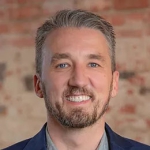 21 years of structural engineering experience and more than 28 years in the in the architectural, engineering and construction fields. Licensed professional engineer in 33 states. Extensive background in residential and commercial real estate operation and management. Passionate entrepreneur and world traveler with a thirst for learning.
21 years of structural engineering experience and more than 28 years in the in the architectural, engineering and construction fields. Licensed professional engineer in 33 states. Extensive background in residential and commercial real estate operation and management. Passionate entrepreneur and world traveler with a thirst for learning.
You can also reach out to Don Williams at https://donwilliamsglobal.com
Please join Don and his businesses in support of St. Jude’s Children Research Hospital in its Mission to cure Childhood Cancers. You can donate to St. Jude at stjude.org/donate
